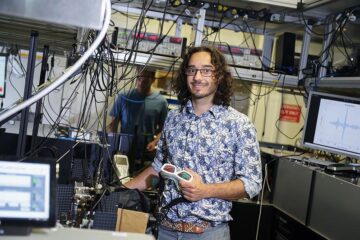International Conference Will Highlight Societal and Economic Impact of Basic Research

International Experts will examine methods for evaluating and reinforcing the impact of basic research. The international conference Science Impact – Rethinking the Impact of Basic Research on Society and the Economy is aimed at stimulating public discussion and promoting awareness of basic research. Scientists, funding bodies and decision makers are invited to participate. A detailed programme as well as the conference brochure including the abstracts of all presentations is available via http://www.science-impact.ac.at.
Apart from three keynotes that will discuss aspects of Economy, Science Theory and Science the first part of the conference will deal with The Impact of Basic Research: Theory, History, Expectations. Theoretical and historical overviews will be discussed. It is generally agreed that basic research drives economic and societal progress, yet the processes through which science evolves into knowledge need further discussion. As an example, the accuracy of the linear and dynamic model needs careful examination. To understand the status quo, the conference will offer opportunities to address the expectations for the impact of basic research including specific questions such as: What part does chance play in scientific investigation? And can serendipity be systematically exploited? What influences can and should the expectations of industry and society exert on the search for knowledge?
Funding Models and their Influence on the Impact of Basic Research will be examined in the second part of the event. On the basis of a wide variety of established funding models cases of best practice will be presented that all aim to maximize the social and economic impact of basic research. New approaches to research funding are growing in importance, aimed at the productive use of basic research. As an example, researchers from different disciplines are forming new teams working at the interfaces between traditional structures. The funding schemes – both project-based and institutional – that make such developments possible will be illustrated by success stories and the possible principles, which can be derived from them, will be discussed. This second part of the conference will also investigate how to allocate the responsibility for research funding among local, regional and national government and the European Union (EU) for maximum impact.
A further section Scope, Limits and Role of Impact Evaluation of the conference will be devoted to methods and tools for evaluating the impact of basic research. The aim of this section is to develop indicators and methods of evaluation for use in assessing research funding models. Practical examples and cases will be presented.
Each session consists of a short introduction by the Chair, three lectures and a closing discussion. At the beginning of each discussion two Early Stage Researchers will hold short presentations. The conclusion of the conference will be a „round table“ with speakers from all sessions participating. The “round table” follows a lecture with a conference summary and suggestions for the future.
Prominent Speakers e.g. from the Georgia Institute of Technology, Institut nationale de la recherche scientific (INRS), Weizmann Institute of Science, Harvard University, University of Twente, University of Sussex, Northwestern University, Technology Foundation STW, UNU-MERIT, University of York, will contribute to the conference.
The conference will be concluded on the evening of the 11 May by Gerhard Widmer, University of Linz, Austria with a lecture on the topic of The Beauty of Basic Research. A part of the lecture is a piano concert by Erika Chun, a young rising pianist from Vienna. The title of the lecture and the music of Mozart as a part of the lecture will show that „beauty“ also can enforce the impact of basic research.
For details on registration and the conference programme please visit our website: http://www.science-impact.ac.at
Kontakt:
Alexander Damianisch (Project Manager)
Der Wissenschaftsfonds FWF / Austrian Science Fund
Haus der Forschung
Sensengasse 1, 1090 Vienna
Austria
T: 0043 / 1 / 505 67 40 – 8112
alexander.damianisch@fwf.ac.at
science.impact@fwf.ac.at
http://www.fwf.ac.at
Media Contact
Alle Nachrichten aus der Kategorie: Veranstaltungsnachrichten
Neueste Beiträge

Neue universelle lichtbasierte Technik zur Kontrolle der Talpolarisation
Ein internationales Forscherteam berichtet in Nature über eine neue Methode, mit der zum ersten Mal die Talpolarisation in zentrosymmetrischen Bulk-Materialien auf eine nicht materialspezifische Weise erreicht wird. Diese „universelle Technik“…

Tumorzellen hebeln das Immunsystem früh aus
Neu entdeckter Mechanismus könnte Krebs-Immuntherapien deutlich verbessern. Tumore verhindern aktiv, dass sich Immunantworten durch sogenannte zytotoxische T-Zellen bilden, die den Krebs bekämpfen könnten. Wie das genau geschieht, beschreiben jetzt erstmals…

Immunzellen in den Startlöchern: „Allzeit bereit“ ist harte Arbeit
Wenn Krankheitserreger in den Körper eindringen, muss das Immunsystem sofort reagieren und eine Infektion verhindern oder eindämmen. Doch wie halten sich unsere Abwehrzellen bereit, wenn kein Angreifer in Sicht ist?…





















